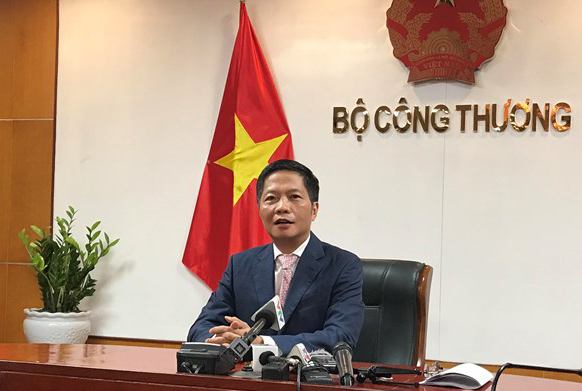The European Union – Viet Nam Free Trade Agreement (EVFTA) is set to be signed in Ha Noi on June 30. Minister of Industry and Trade Tran Tuan Anh spoke to local media about the historic trade deal.

The European Union – Viet Nam Free Trade Agreement (EVFTA) is set to be signed in Ha Noi on June 30. Minister of Industry and Trade Tran Tuan Anh spoke to local media about the historic trade deal.
Could you tell us about the negotiation process of the EVFTA and how the Ministry of Industry and Trade approached the negotiations?
Negotiations for the EVFTA and the EU-Viet Nam Investment Protection Agreement (EVIPA) were launched and concluded amidst the sound Viet Nam-EU partnership, especially in economy and trade.
With 17 chapters, two protocols and several attached memorandums with main contents including trade in goods, services, investment, trade defence, competition, state enterprises, government procurement, intellectual property, trade and sustainable development, legal and institutional issues, the EVFTA is considered a comprehensive, high quality agreement that ensures a balance of benefits for both Viet Nam and the EU.
At the same time, the agreement complies with the provisions of the World Trade Organisation (WTO). The EVFTA has taken into consideration differences in development levels between the two sides.
On June 25, the European Council approved the EU-Viet Nam trade and investment agreement, paving the way for the conclusion on June 30 in Ha Noi.
If implemented, the EVFTA will be a huge boost for Viet Nam's exports, helping diversify markets, especially agricultural and aquatic products as well as Vietnamese products which have competitive advantages.
Commitments included in the EVIPA will contribute to building a transparent legal and investment environment, helping Viet Nam attract more investors from the EU and other markets.
The negotiations and implementation of the agreements conveyed a positive message on Viet Nam’s determination in promoting its integration into the world economy.
How is the EVFTA different from other free trade agreements Viet Nam is involved in?
Viet Nam's exports to the EU market reached nearly US$42 billion and the growth rate of Viet Nam to the EU in exports is very high, reaching 17 per cent. Especially, the interaction and complementary natures of the two markets are very large and wide.
Therefore, the room for export growth, economic co-operation and other fields is huge. For example, in the first year, more than 85.6 per cent of Viet Nam's tariff lines will be reduced, even to zero per cent. Up to nearly 100 per cent of tariff lines within seven years will fall to zero after the agreement takes effect.
Viet Nam is enjoying trade preferences offered unilaterally by the EU under the General Scheme of Preferences (GSP). However, only 42 per cent of tariff lines are zero. Soon, when Viet Nam reaches a higher economic development level, GSP regulations will no longer apply to the country.
Therefore, I think the EVFTA is very important to help Vietnamese products, services and goods be competitive, develop in the European market and be able to form value chains.
Alongside this, Viet Nam’s major products will enjoy preferential tax rates as well as favourable conditions for trade. Farm produce, rice, coffee, honey, livestock and fruit will benefit most from the deal.
Products with high prospects in the EU include apparel, footwear, wooden furniture, IT and industrial products as they will enjoy tax cuts in the upcoming years.
If the EVFTA takes effect in 2020, the growth rate of Viet Nam’s exports to the EU will increase 20 per cent and are predicted to reach 70-80 per cent in 2025-30, giving a boost to GDP.
What are the main Vietnamese export products that will benefit from the EVFTA?
As a high quality agreement, the elimination of tariff barriers would be at the highest level and that will benefit for Vietnamese enterprises and products. For example, agricultural products, seafood, sugar, rice, honey, processed agricultural products, wood products, textiles, footwear, furniture and the automobile industry will enjoy preferential treatment from Europe.
In addition, when committing to open markets, industries such as processing, manufacturing, automotive, IT, livestock, agricultural products and processed foods must take into account competitive pressure. However, at the level of deep integration, Viet Nam must identify competition with positive meaning, to meet quality requirements, create competitiveness for Viet Nam to restructure, improve capacity and efficiency as well as investment in development.
This is an opportunity for Viet Nam to have better development as well as value chains with its partners and thereby bring higher investment efficiency to the economic sectors.
In term of investment , the EU is the leading partner of Viet Nam with a scale of nearly $22 billion each year.
The EU’s strong sectors such as services, finance, automobile, processing and manufacturing, IT, high technology, agriculture and food processing are the areas that Viet Nam needs investment for comprehensive development.
How should businesses prepare for the EVFTA?
The conclusion of negotiations is the prerequisite, but the readiness of enterprises which will be directly impacted by the deal is more important.
Businesses should be more proactive in accessing resources, particularly, small and-medium-sized enterprises should make comprehensive preparations and do careful research of opportunities and challenges, thus rolling out responding solutions to improve their products’ quality, competitiveness and productivity.
Businesses should ensure that their products meet requirements on traceability, technical standards, as well as plant and animal safety and hygiene criteria of the EU. — VNS





